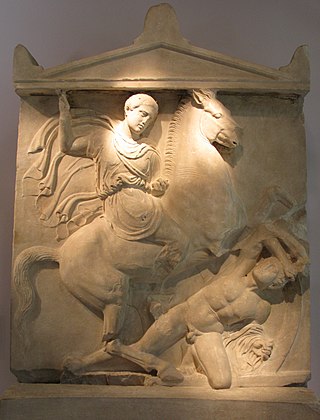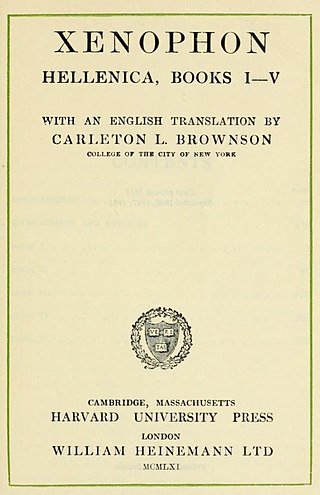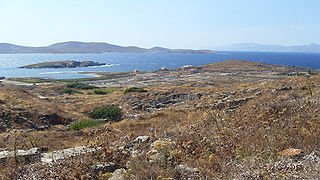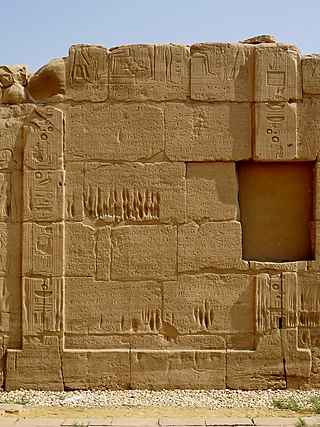
The Second Peloponnesian War, often called simply the Peloponnesian War, was an ancient Greek war fought between Athens and Sparta and their respective allies for the hegemony of the Greek world. The war remained undecided until the later intervention of the Persian Empire in support of Sparta. Led by Lysander, the Spartan fleet finally defeated Athens which began a period of Spartan hegemony over Greece.

The 5th century BC started the first day of 500 BC and ended the last day of 401 BC.

The King's Peace was a peace treaty guaranteed by the Persian King Artaxerxes II that ended the Corinthian War in ancient Greece. The treaty is also known as the Peace of Antalcidas, after Antalcidas, the Spartan diplomat who traveled to Susa to negotiate the terms of the treaty with the king of Achaemenid Persia. The treaty was more commonly known in antiquity, however, as the King's Peace, a name that reflects the depth of Persian influence in the treaty, as Persian gold had driven the preceding war. The treaty was a form of Common Peace, similar to the Thirty Years' Peace which ended the First Peloponnesian War.

The Greco-Persian Wars were a series of conflicts between the Achaemenid Empire and Greek city-states that started in 499 BC and lasted until 449 BC. The collision between the fractious political world of the Greeks and the enormous empire of the Persians began when Cyrus the Great conquered the Greek-inhabited region of Ionia in 547 BC. Struggling to control the independent-minded cities of Ionia, the Persians appointed tyrants to rule each of them. This would prove to be the source of much trouble for the Greeks and Persians alike.
The Peace of Callias is a purported peace treaty that supposedly was established around 449 BC between the Delian League and the Achaemenid Empire and ended the Greco-Persian Wars. The peace would then be the first compromise treaty between Achaemenid Persia and a Greek city.

The Battle of Kadesh took place in the 13th century BC between the Egyptian Empire led by pharaoh Ramesses II and the Hittite Empire led by king Muwatalli II. Their armies engaged each other at the Orontes River, just upstream of Lake Homs and near the archaeological site of Kadesh, along what is today the Lebanon–Syria border.

A peace treaty is an agreement between two or more hostile parties, usually countries or governments, which formally ends a state of war between the parties. It is different from an armistice, which is an agreement to stop hostilities; a surrender, in which an army agrees to give up arms; or a ceasefire or truce, in which the parties may agree to temporarily or permanently stop fighting.

The New Kingdom, also called the Egyptian Empire, refers to ancient Egypt between the 16th century BC and the 11th century BC. This period of ancient Egyptian history covers the Eighteenth, Nineteenth, and Twentieth dynasties. Through radiocarbon dating, the establishment of the New Kingdom has been placed between 1570 BC and 1544 BC. The New Kingdom followed the Second Intermediate Period and was succeeded by the Third Intermediate Period. It was the most prosperous time for the Egyptian people and marked the peak of Egypt's power.

The Corinthian War was a conflict in ancient Greece which pitted Sparta against a coalition of city-states comprising Thebes, Athens, Corinth and Argos, backed by the Achaemenid Empire. The war was caused by dissatisfaction with Spartan imperialism in the aftermath of the Peloponnesian War, both from Athens, the defeated side in that conflict, and from Sparta's former allies, Corinth and Thebes, who had not been properly rewarded. Taking advantage of the fact that the Spartan king Agesilaus II was away campaigning in Asia against the Achaemenid Empire, Thebes, Athens, Corinth and Argos forged an alliance in 395 BC with the goal of ending Spartan hegemony over Greece; the allies' war council was located in Corinth, which gave its name to the war. By the end of the conflict, the allies had failed to end Spartan hegemony over Greece, although Sparta was weakened by the war.

Hellenica simply means writings on Greek (Hellenic) subjects. Several histories of 4th-century Greece, written in the mould of Thucydides or straying from it, have borne the conventional Latin title Hellenica. The surviving Hellenica is an important work of the Ancient Greek writer Xenophon and one of the principal sources for the last seven years of the Peloponnesian War not covered by Thucydides, as well as the war's aftermath.

The idea of the Common Peace was one of the most influential concepts of 4th century BC Greek political thought, along with the idea of Panhellenism. The term described both the concept of a desirable, permanent peace between the Greek city-states (poleis) and a sort of peace treaty which fulfilled the three fundamental criteria of this concept: it had to include all the Greek city-states, it had to recognise the autonomy and equality of all city states without regard for their military power, and it had to be intended to remain in force permanently.

Classical Greece was a period of around 200 years in Ancient Greece, marked by much of the eastern Aegean and northern regions of Greek culture gaining increased autonomy from the Persian Empire; the peak flourishing of democratic Athens; the First and Second Peloponnesian Wars; the Spartan and then Theban hegemonies; and the expansion of Macedonia under Philip II. Much of the early defining mathematics, science, artistic thought, theatre, literature, philosophy, and politics of Western civilization derives from this period of Greek history, which had a powerful influence on the later Roman Empire. Part of the broader era of classical antiquity, the classical Greek era ended after Philip II's unification of most of the Greek world against the common enemy of the Persian Empire, which was conquered within 13 years during the wars of Alexander the Great, Philip's son.
The Thirty Years' Peace was a treaty signed between the ancient Greek city-states of Athens and Sparta in 446/445 BC. The treaty brought an end to the conflict commonly known as the First Peloponnesian War, which had been raging since c. 460 BC.

Ramesses II, commonly known as Ramesses the Great, was an Egyptian pharaoh. He was the third ruler of the Nineteenth Dynasty. Along with Thutmose III of the Eighteenth Dynasty, he is often regarded as the greatest, most celebrated, and most powerful pharaoh of the New Kingdom, which itself was the most powerful period of ancient Egypt. He is also widely considered one of ancient Egypt's most successful warrior pharaohs, conducting no fewer than 15 military campaigns, all resulting in victories, excluding the Battle of Kadesh, generally considered a stalemate.

The Wars of the Delian League were a series of campaigns fought between the Delian League of Athens and her allies, and the Achaemenid Empire of Persia. These conflicts represent a continuation of the Greco-Persian Wars, after the Ionian Revolt and the first and second Persian invasions of Greece.

The Nineteenth Dynasty of Egypt, also known as the Ramessid dynasty, is classified as the second Dynasty of the Ancient Egyptian New Kingdom period, lasting from 1292 BC to 1189 BC. The 19th Dynasty and the 20th Dynasty furthermore together constitute an era known as the Ramesside period. This Dynasty was founded by Vizier Ramesses I, whom Pharaoh Horemheb chose as his successor to the throne.

The Egyptian–Hittite peace treaty, also known as the Eternal Treaty or the Silver Treaty, was concluded between Ramesses II of the Egyptian Empire and Ḫattušili III of the Hittite Empire around 1259 BC. It is the oldest known surviving treaty and the only one from the ancient Near East for which versions from each party have survived. Though it is sometimes called the Treaty of Kadesh, the text itself does not mention the Battle of Kadesh, which took place around 1274 BC. Both sides of the treaty have been the subject of intensive scholarly study. Despite being agreed upon by the Egyptian pharaoh and the Hittite king, it did not bring about an enduring peace; in fact, "an atmosphere of enmity between Hatti and Egypt lasted many years" until the eventual treaty of alliance was signed.

The kingdom of Macedonia was an ancient state in what is now the Macedonian region of northern Greece, founded in the mid-7th century BC during the period of Archaic Greece and lasting until the mid-2nd century BC. Led first by the Argead dynasty of kings, Macedonia became a vassal state of the Achaemenid Empire of ancient Persia during the reigns of Amyntas I of Macedon and his son Alexander I of Macedon. The period of Achaemenid Macedonia came to an end in roughly 479 BC with the ultimate Greek victory against the second Persian invasion of Greece led by Xerxes I and the withdrawal of Persian forces from the European mainland.
Philiscus or Philiskos was a 4th-century BC Greek tyrant of the city of Abydos, on the Asian side of the Hellespont, and a hyparch ("vice-regent") and military commander of the Achaemenid satrap Ariobarzanes. He was sent by Ariobarzanes in 368 BCE as an Achaemenid emissary to Delphi, where the Greek cities at war between themselves had assembled for peace negotiations. Philiscus had probably been sent at the request of either Athens or Sparta, to help solve the conflicts between the Greek city-states.
















